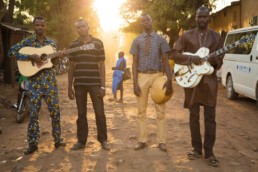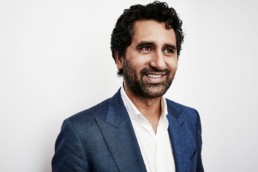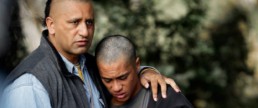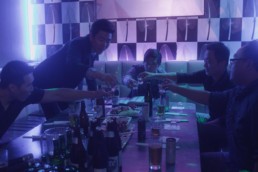'A Bigger Splash' Dives Deep Into a Sultry Rock Star Vacation
With an electrifying opening that can’t help but leave one immediately compelled, it’s in those first few minutes that A Bigger Splash makes its biggest mark at engaging the viewer. Like one of Tilda Swinton’s previous master films, We Need to Talk About Kevin, through a quick series of images and scenarios, we are told little but can sense that something is just a bit off.
The story begins when the rock star, Marianne Lane, and her boyfriend, Paul De Smedt, (Swinton and Matthias Schoenaerts) are interrupted by an old friend of theirs, Harry Hawkes, and his newly discovered daughter, Penelope Lannier (Ralph Fiennes and Dakota Johnson). These four characters each make up a corner of this film and equally tug at the fabric of the situation. Within the backdrop of a gorgeous house in Sicily, what unfolds is an erotic and also cringe-worthy dive into these characters and their relationships.
It’s clear early on that a major source of conflict will come from the various love and attractions that cross between the four characters, and equally important is the backstory that will unfold as it becomes increasingly clear that these people have a lot of baggage between them. The true heart of the film is Ralph Fiennes’ character Harry, the most boisterous of the bunch who also has the highest stakes in every relationship with the other four. Fiennes is an actor who has done such a wide variety of roles and blends so effortlessly into each one that it’s amazing he isn’t immediately thought of as an A-list star when he brings so much charisma everywhere he goes. Here, his character never sits still, never shuts up, and never misses an opportunity to dance or get naked. It’s as fun as you think it sounds.
Unfortunately, the one character whose motivations are never made clear is Schoenaerts’ character. Here is a very talented actor whose ability to be a heartthrob and also a serious artist is captivating to watch on screen. Furthermore, he has picked compelling material since becoming a breakout name. In this role, however, he is the one character whose actions and motivations I could not understand in terms of how they aligned with the story. Without saying too much, it seems too easy to let him quietly not explain many of the decisions he makes that shift the relationship with all the other characters.
Had the movie maintained the level of intrigue and quick visuals seen in the first few minutes, I would comfortably call this one of the best of the year. That being said, even once it’s underway, A Bigger Splash is an extremely sexy, compelling character study rich with human conflict and melodrama in ways not many other films are. By the time the movie is over, you’ll want to be booking a trip to Sicily, yet simultaneously wanting to cleanse yourself of all the hidden desires that we all carry with us.
A Bigger Splash is rated R for graphic nudity, some strong sexual content, language and brief drug use. Now playing at The Landmark.
'Ribbons' Ties Great Performances to an Indie Thriller
Opening with a crazy scene of a motel crime with images you don’t see every day, from the get-go Ribbons promises to be a film where all bets are off as to where we’ll end up over the course of the runtime.
It quickly diverts us to our protagonist Vincent (Patrick Hickman), a veteran who is near suicidal after all the trauma he has experienced and has lost the reason to live. At a dive bar he meets Rachel (Haidyn Harvey), a teenager so clearly underage she has to have a backstory dark enough to lead her there. Overnight the two fall for each other, and next thing he knows, Vincent has found himself roped into a tense situation involving Rachel’s step-dad, Armenian mobsters, strippers, and cops.
While the two different storylines create for a confusing beginning, once the primary story gets underway the film finds its stride. The character of Bishop (Brian Krause), Rachel’s step-dad, gets the most material to chew as he is the definition of sleazy in every way, yet as the plot unfolds his behavior amazingly begins to all make sense. The three aforementioned protagonists are each given dynamic range and what initially seems like predictable character decisions end up having bigger payoffs later. The supporting characters are not given as much space and the secondary plot involving the cops/Armenians isn’t in the film long enough to go too in depth, but since the majority of the drama is between these three, once tension escalates it’s easy to get tied up in their story.
Perhaps the best moment comes when we realize that Rachel is more than who we thought she was. It is initially difficult to see a girl who looks so young inhabiting the world these characters live in with so much composure, but after we learn a few more details of her backstory, as well as her motivations, the earlier setups pay off. This in many ways summarizes the overall experience: the numerous rough edges are smoothed out thanks to the character layers that our protagonists are given.
Overall, Ribbons showcases the strength that a low-budget thriller should have, specifically strong developed lead characters and enough plot twists to feel fresh and keep the audience guessing. It contains serious topics such as PTSD, domestic violence, and drug use, but is best enjoyed as a pulpy thrill ride of the pure independent form.
Ribbons opens today with a limited theatrical release at Laemmle NoHo (until 4/16)
'Green Room' Proves That Young Director Saulnier Is Far From Green
Independent films often have a side story of their creation equally as compelling as the story within the film itself. It takes insurmountable odds to make a feature film. Writer/director Jeremy Saulnier’s breakout feature, Blue Ruin, intrigued me just from the story of how much work (and how many maxed out credit cards) it took to get it off the ground.
But upon Ruin's beginning, none of that story compared to how thrilling and well-executed the movie actually was. With all that said, I could not wait for whatever Saulnier decided to do next.Enter Green Room. There are numerous similarities–primarily in style–to these two features, but they are unique enough that they can be enjoyed separately.
A punk rock band that is barely making ends meet gets a last-minute, $350 gig, at a Neo-Nazi bar in the backwoods of Oregon. When they witness an act of violence backstage that they weren't meant to see, let’s just say things go foul from there.
Again, we are put into a thrilling situation and then given a white-knuckle ride for the remaining duration. This one is essentially punk-rocker-good-guys on the inside vs. skinhead-bad-guys on the outside, and as soon as the pacing begins, it’s a tense experience until the very last shot.
One of Saulnier’s intriguing signatures is his deliberate use of the color in the movie title. Green Room features some element of green hue in nearly every shot, ranging from the harsh neon lights in the punk club to the awe-inspiring greenery of the rural Oregon scenery. As someone who loves viewing a director’s filmography, it excites me to think what color he might employ next in his through-line.
Anton Yelchin leads the cast with Imogen Poots and various other semi-familiar faces (Alia Shawkat, Callum Turner and Joe Cole) who round up the remaining punk rockers. On the opposition, Patrick Stewart plays the leader of the Nazis, Darcy Banker, and while it's not as terrifying as similar villains, Stewart slips into the role extremely well and creates a compelling and antagonizing force. Macon Blair, Saulnier’s Blue Ruin lead, plays Gabe, a conflicted Nazi, in this film and while his performance is another solid one where he nails all of those subtle beats at just the right moments, the pace at which his character develops leaves us feeling a bit short-changed. Further time spent with Gabe could have possibly made this his most creepy and memorable film yet. That being said, Green Room is a film where the character development and drama plays second fiddle to the intense visceral suspense that is drawn out in nearly every scene.
High tension thrillers are extremely hard to pull off, but have the potential to be some of cinema’s best when they do. Saulnier has now notched two under his belt and shows a clear upward trajectory. Call me a fan of both this movie and its director, and I look forward to the next thrill ride in this filmography.
Green Room is Rated R for strong brutal graphic violence, gory images, language and some drug content. In theaters in LA/NY Friday, April 15th, with a national rollout April 29th.
'The Syndrome' Investigates the Science–or Lack Thereof–Behind 'Shaken Baby Syndrome'
Many people grew up hearing the horrific media coverage of shaken baby syndrome; the term alone evokes a sense of fear that people abuse their children in such a manner. However, many innocent parents or guardians are wrongly accused of abusing their children due to head trauma caused by something they did not do. Meryl Goldsmith’s new documentary The Syndrome, which played last night at the Newport Beach Film Festival, is an exposé that shows that the concept of SBS is false and "outdated science" proven in a court of law, yet still has caused thousands of people to be convicted as homicidal killers. The trouble is that centers with specialized knowledge on the syndrome (and receive millions of dollars annually to conduct research) have a lot to lose if the world finds out how inaccurate their science truly is.
The film begins with repetitive news clips demonstrating just how much this is publicized. The most haunting images are those of the so-called experts violently shaking dummy babies, allegedly to show the effects it can have on the child, but it comes across as a twisted expression of anger. Early on it is made very clear that not all is right when it comes down to diagnosing this syndrome.
This controversial subject serves as a microcosm for other sensationalist media stories shown on news stations today. The trouble is just how many doctors back these accusations, even though many of their scientific claims are not based on a proper study. Because of how easy it became to villainize these people, science and actual facts are pushed out of the way.
Unlike other exposé documentaries, the filmmaker’s goal is not to change someone’s habits or lifestyles, but to encourage more critical thinking of experts who claim to have answers, and not be so quick to assume that what we see on the news is undisputed truth. Authority persuasion happens daily in the media, and often only in hindsight do we realize how false it may be. Not surprisingly, none of the opposing doctors agreed to participate in The Syndrome, but thankfully while the film has a clear message of what is not right, it never feels unreliably biased. By the time you’re done watching the film, you’ll have a deeper understanding of how scientific fact still leaves room for debate, and the horrifying realities of claims made not too long ago.
Like any great documentary, The Syndrome will leave audiences permanently informed on an issue that otherwise would not be coming to light.
This review originally ran on May 1st, 2015 during the Newport Beach Film Festival
The Syndrome opens this Friday for a limited theatrical run at the Laemmle Music Hall.
'They Will Have to Kill Us First' Documents Mali Musicians Fighting Against Oppression
Taking us into a story that deserves to be heard worldwide yet most certainly hasn’t been circulated, They Will Have to Kill Us First follows four musicians from Mali as a radical separatist organization called the MNLA (National Movement for the Liberation of Azawad) seized the government and steps in proclaiming jihad and in turn banning music of all forms. In a place where radio, wedding singers and even the strum of a guitar are suddenly illegal and punishable by death, these musicians find themselves as rebels fighting back against oppression. One of the musicians describes living without music as “like cutting off oxygen,” and indeed, it's impossible to imagine what kind of profound effect this would have.
When analyzing a documentary of such important narrative, it’s difficult to separate the technical review from the narrative review. The initial premise outlined above is electric and seems like essential viewing while the film itself simmers much lower than this concept. Juggling between four protagonists, it begins to feel a bit like a documentary that merely follows its subjects rather than asking pertinent questions. Occasionally, the subjects share insights that are truly powerful. For example, one shares the ultimate hypocrisy of the jihad as being a religious struggle when he’s seen soldiers partaking in drugs and alcohol despite their unholy status. This nugget asks the question if these religious “holy wars” may in fact just be masks for obtaining power and control. When 98% of Malian citizens are already Muslim, why does a regime feel the need to claim jihad if not merely for power purposes?
Another powerful moment is when Moussa, a musician that relocates to Burkina Faso to save his life, recognizes that his traditional beard and turban make locals and tourists think he is one of the radicals, and so we see him remove his traditional garb from day-to-day wear. However, every moment as strong as this is accompanied by a series of images that aren’t as insightful or pushing the narrative forward.
With the four protagonists, we get a string of narratives and insights into their lives. Disco shares her unique relationship with her military husband. The Songhoy Blues get put in a conflicted state when they’re able to tour England and make a name for themselves but at the price of leaving their home country that they’re fighting for behind.
These each have their own intriguing pieces and shed light on the situations they find themselves in. Yet the connection of these and the large stakes at hand aren’t always in sync, and sometimes director Johanna Schwartz's They Will Have to Kill Us First falls more in line of documentation and archive rather than a complete arc of a feature. The climactic concert feels like a missed opportunity to make a profound, emotional statement about the situation. This is a case where the film’s importance is worth noting because of how well this film sheds light onto an otherwise overlooked story but leaves behind some of the craft that could elevate the documentary itself as a piece worth commemorating. In the end, there is much gratitude to be had for any film that is telling important stories the mainstream media has not deemed worthy of airtime.
They Will Have to Kill Us First is now playing at the Laemmle Film Center in Santa Monica with additional markets to follow.
Cliff Curtis Of 'The Dark Horse' on the Philosophy of Chess Pieces [LISTEN]
[soundcloud url="https://api.soundcloud.com/tracks/256793269" params="color=ff5500&auto_play=false&hide_related=false&show_comments=true&show_user=true&show_reposts=false" width="100%" height="166" iframe="true" /]
In "The Dark Horse," New Zealand-born actor Cliff Curtis takes on the role of Genesis, a bipolar chess master who taught Maori children the art of the game while battling a string of mental problems and avoiding homelessness. Pulling from such a detailed true story benefits the film immensely, allowing for Curtis to completely transform into the role (he gained 60 pounds and stayed in character for the entire filming duration) and for us to gain a true exploration of this world. In our exclusive interview with Curtis, we talk about the philosophy of chess, which chess piece he considers himself most like, and his own rough childhood as an orphan. We begin:
For American audiences, or for non-New Zealand audiences, is there anything that we might have missed that New Zealanders would have noticed that we didn’t pick up on?
(Pause) Hmm... I don’t know, that’s an interesting question. I think there’s some sort of things that are from my culture and heritage around mythology, around Maori mythology, that we wove into the narrative. And we looked at the metaphors of the chess pieces, and we wove into that characters from our mythology like Maori, which is a Polynesian version of a Greek God, like Hercules or something. And so, we talked about Maori as like a metaphor for a king. So some of those things might be foreign to US audiences. Except for Hawaiians, they’ll know exactly what we’re talking about.
How long has chess been a part of Maori culture? Is it relatively new?
Oh, yeah. It was very recent. Maybe a hundred years or so, hundred and fifty years or so.
I love the metaphor of the king, the chess piece, and how it can only move one square at a time...
Yeah, so that was really cool, because I got to develop my own philosophies around that, because I didn’t play before the start of the movie. And I started to understand the game, and sort of looked at the metaphors, the sort-of teaching tools that Genesis had developed over his years of teaching chess. And I looked at the mythology, and I started to apply my own sort of like, philosophies around what the pieces represent.
Is there a particular piece that you connect with yourself?
For me, it’s the pawns. It’s that, you’ve got, individually, the least powerful, but if they’re well coordinated, and that they work together, a pawn... metaphorically, looking at the film, you’ve got these disenfranchised kids that have come from gang life, and they don’t feel powerful, they feel helpless. However, if they work together, with the support of the people around them, they can change their lives. And a pawn, if it gets to the other side of the board, can become anything it wants. So, that’s the coolest piece on the board to me. It can become the Queen, it can become a bishop, a rook, a knight... and then you can multiply that. You could have, in theory, you could have nine queens on the board.
I think the pawns, the “humble pawn” is like, my favorite piece – philosophically. But when I’m playing... the idea is to protect the king. And see the king, I discovered, a philosophy of my own, where it was what the king represents, in life, in the game of life, is one’s purpose. Because it’s like, what can you live with, you can have a lot of advantages in life – you might be good looking, you might have a great job, you might have money, and you might have lots of opportunities. But if you don’t have a clear purpose for yourself in your life, you feel lost.
Or, alternatively, in this movie, we have a guy whose got nothing. He’s completely, he’s homeless! He doesn’t have mental stability, he doesn’t have family to support him, but he finds purpose. And so, the king on the board represents our purpose. A nation, a company, a business, if it doesn’t have a clear purpose, a marketing campaign, you know, this article you’re writing... if you don’t find a clear purpose for what you’re doing, you can lose your way. So that’s very interesting, I started to look at the metaphors for the pieces on the board. And therefore, if you lose your purpose, you’re out of the game.
And then with the queen, for me, became the soul, your soul. It’s like your soul connection, cause you might have a philosophically, or ideologically, or intellectually have an idea, but if you don’t feel a soul connection with it, if you don’t feel spiritually aligned or excited, it sort of just sits there. It seems it doesn’t have any power. And it’s like, you need those combined powers. And so, I really started to appreciate philosophy the way Genesis combined philosophy with the game of chess, and how we taught those principles to children – not just children. He also taught – and we didn’t have time for another movie – he also taught judges and lawyers, he mixed it up with mathematicians and geneticists and philosophers. He was a deep thinker.
So, I love the way how he used the game of chess as a metaphor for how to cope with life, and how to deal with life. How to compartmentalize, how to strategize, how to think things through before you take that move, think about the consequences of your actions. And for young people, and for old people alike, those are really helpful tools in life, to actually step back from the situation you’re in, and to get a clear picture of what is actually going on, to analyze your next best move, and then to secure a position for yourself that’s going to get where you want to go. And to protect your purpose in life.
How did you become familiar with Genesis’ story?
Through the movie. First, I read the script. Then I didn’t really think I was right for the role, I couldn’t understand, I didn’t think I was going to be capable of playing that role, I didn’t really see myself in the role. The size, and chess, and there were a lot of other things in the role I didn’t relate to... I related more to the kids than to Genesis.
And then I talked to the director ,which was really helpful, he really helped me kind of like get to that next stage creatively, like the creative potential of what we could do with the role in the movie. And then I watched the documentary, and when I watched the documentary, I was like, “Wow! (Genesis) is something else.” The role became challenging, moved from being challenging to impossible. And once it became an impossible role, I thought, this is a once in a lifetime opportunity. The director and I agreed that we were either going to succeed or fail spectacularly. And so, we did our best, we really just threw ourselves into it.
Can you talk about working with the kids on set?
I really related to the kids in the story, they are the heart of the movie really. They're so natural, they're not acting, you know, they're just being themselves. They just happen to be in front of the camera. We had a great acting coach who worked with James Rolleston and helped [the kids] become a unit. It was beautiful man, they're really inspiring. I've dedicated the better part of my life to understanding the art and craft of acting and storytelling and it's really weird when you see these kids, non-actors, come in and be better at it than me, haha.
The Dark Horse was released in New Zealand about two years ago and is just now getting its stateside release. How do you keep your excitement going about this project?
CC: Our business is a marathon, there's no sprinting in our game, really. It is kind of an arduous process from development to production to delivery to sales and then distribution and marketing. It's a long run. I'm used to it in some ways but this isn't a hard project to keep enthusiasm up about. This is a once-in-a-lifetime project, this is probably the best work I've done, and quite possibly the best work I'll ever do in my career. To me, it's a privilege to tell stories about these people in our communities that are unsung heroes. People do this work every day, helping the old and the young and the disenfranchised, and they're not getting paid for this work. They do it out of love. They are these angels in our communities. These are beautiful stories and it's a huge privilege to be able to honor those people and they work that they do and the lives that they changed. The cool part is, through this movie, we just got a letter last night from this kid who was in the gang life, saw the movie, and has now left the gang and is turning their life around. Because of the movie! So the work that Genesis did in his real life, now that we've re-imagined it in a movie format, his work continues. As an artist, to have stories that bring people together and helps them realize they can change their personal circumstances by working together, by accepting help and by giving help. It's very easy for me to stay passionate about that.
That ripple effect is so amazing.
CC: Yeah, and that we're here in Hollywood! I'm one of those kids from that movie, literally I am one of those kids. I was a ward of the state with a social worker, I was an orphan for a period of my life. So for me to be one of those kids in real life and to be sitting here in a suit in Hollywood talking about a movie about that, you know, we're already a success. We've already made it. Of course, now we've got to figure out box office and get people to see the movie, but for us, it's a massive accomplishment.
You've taken roles like 'Travis Manawa' in Fear the Walking Dead and 'Porourangi' in Whale Rider, what's it like going back and forth between New Zealand and non-New Zealand roles?
CC: Honestly, it's a blessing. It's hard to make a living doing this in New Zealand, haha! I think a part of what helps me to promote this movie is that fact that I'm on Fear the Walking Dead. It helps me be able to promote these little movies. [In the U.S.] I'm a "gig-ing" actor, I have a little bit of a niche here in Hollywood where I can work, but when I'm back home I get to really cherry pick and choose the projects I think are really going to be significant. Oh, I also got to play 'Jesus' in Risen which was really cool, haha! Genesis was a Christian, he loved Jesus. One of the things that intrigued me about [Genesis] was that he thought he was Christ come back to save all humanity when he was in his high state of mania.
Do you have any advice for indigenous actors that you've experienced that they could benefit from?
CC: It can be really tough when you view yourself as indigenous and other people view you as only ethnic, then straight away you're dealing with the stigma of like bad guys, drug dealers and all that kind of stuff. I think it's important to focus on your craft and the artistry of what you do and to develop your self-awareness and your self-belief to the point where you have something to offer as an artist because that transcends your ethnicity. I never thought I'd get to play Jesus, that was amazing. Fear the Walking Dead changed my character from a white guy to Maori! So in my own, humble career, I've achieved some significant milestones but I think it comes down to grounding yourself and trying to figure out what you are bringing to the game. Being the best craftsperson and artist you can be.
'The Dark Horse' Captures a Piece of the Heart in Maori Chess
Genesis Potini is a figure larger than life: his distinct large body, haircut and lack of teeth make the New Zealander unlike anyone we’ve ever seen. And yet, from the opening scene of The Dark Horse, as we see him wandering around streets wrapped in colorful blankets, he is never intimidating or malicious, but a gentle giant whom we’ll grow to know over time. This true story features New Zealand actor Cliff Curtis playing Genesis, a bipolar chess master who taught Maori children the art of the game while battling a string of mental problems and avoiding homelessness.
Pulling from such a detailed true story benefits the film immensely, allowing for Curtis to completely transform into the role (he gained 60 pounds and stayed in character for the entire filming duration) and for us to gain a true exploration of this world. The worlds of the Maori, the game of chess, and the rough biker culture of Gisbourne all intersect to create something unlike anything we’ve seen.
https://www.youtube.com/watch?v=X3YopiaQ3k8
Initially, the film is a character drama following Genesis through these tribulations. As we reach the conclusion, it falls more in line with a sports drama. It isn't until the end of the film we realize we're watching an underdog sports movie because up until then it has been entirely character driven, making the climactic chess tournament all the more capable of inspiring emotion as we root for the Eastern Knights.
My biggest complaint with last year’s Bobby Fischer biopic, Pawn Sacrifice, was that they made no attempt to engage us into the chess games. With this eye, I watched the chess in this game extra closely. Indeed, the film only gives us a few pieces of information as to what’s going on in the game, but that, paired with how much we care about the characters, allows it to succeed. That, and the numerous times Genesis goes into the metaphorical implications of chess and the pieces, including a very powerful one about the significance of the king, allow this movie to live up to the game.
The Dark Horse is a film that knows which conventions to use in order to best tell an important true story. It keeps the time frame short and impactful rather than trying to display every highlight of a person’s life, a mistake I see too many biopics make. In the end, this is an inspiring and richly distinct independent film that works on every level. It has the potential to stand among the great inspirational movies and be a film to show young people a way out of gang life. Most of all, Curtis’s terrific performance and understanding of the protagonist will ensure that the legacy of Genesis Potini is long remembered.
The Dark Horse opens this Friday. Rated R for language throughout, and drug use. 124 minutes.
SXSW Favorite 'Ktown Cowboys' Takes Bromance to the Streets of LA
It’s clear from the first few minutes that, based on its style, the 2015 SXSW comedy Ktown Cowboys gets its roots from the web series format. We’re introduced to five protagonists, a series of 20-something Korean-American men who are best friends that come together and party regularly in Koreatown (a neighborhood in Los Angeles) to get away from their hectic lives. As one character comically puts it, “We get together and discuss our problems, kind of like AA, except with alcohol.” Each character represents a different facet of the Korean-American first-generation experience in a humorous manner.
The style feels so comfortably short-form at first, one wonders if this is a natural fit for a full-length movie. Fortunately, the dynamic between the variety of characters and a few overarching plot points that develop make the story work as a movie, but most of all, the film succeeds because it is fun. By jabbing the Korean stereotypes while also embracing them, these Cowboys feel as authentic as any film protagonists. At times, Peter (Peter Jae) is a little too one-dimensional, and stand-up comedian character Danny (Danny Cho) never gets fully developed (or just doesn’t have enough lines), but the overall sync is something that works, and by the end we have five distinct personas that we’ve laughed with and enjoyed their company.
The film occasionally breaks the fourth wall (similar to The Big Short) to introduce us to various Korean terminology (slang and serious) which presumably is pulled from the web series and, in this case, gives the film a distinct identity. What makes this work so well is once the term is introduced (example: “Oppa” is what a girl calls an older brother figure) we hear it get used throughout the remainder of the runtime, and begin to connect with the characters from the inside. That and a series of well-placed jokes help us feel like we’re buddies with the characters at the end simply by viewing their film. Well-placed minor roles and cameos by well-known actors Ken Jeong (also executive producer), Daniel Dae Kim (aka Jin from Lost), and Eric Roberts (the guy who’s in 500+ movies) add a layer of credibility and production value to the end result.
A fair criticism stems from the film’s female characters: none are developed at all and the closest we get falls into the biggest Korean stereotype onscreen. While of course the film is all about the bromance between the ensemble, this detractor weakens the authenticity that Ktown Cowboys is so exceptional at. For any film that is debunking stereotypes (even comedy), it should be regarded with extra attention that it isn’t continuing any.
Overall, Ktown Cowboys has such a fun set of characters that I would gladly watch more adventures of this motley crew, and that is perhaps the best compliment one can ask for. In the aftermath of Chris Rock’s Oscars perpetuating Asian stereotypes, and their extreme lack of visibility in American cinema, this is a prime example of how within one culture so many stories can be told, so many actors can thrive, and many fun times can be had.
'Ktown Cowboys' opens this Friday, March 18th, at CGV Cinemas in Los Angeles and on VOD March 25th.

